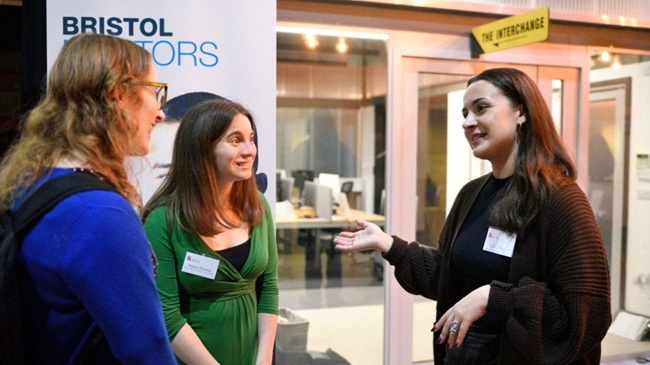Goal 8: Decent work and economic growth
Promote sustained, inclusive and sustainable economic growth, full and productive employment and decent work for all
Our research
The University of Bristol Business School launched its new Resilient and Sustainable Supply Chains research theme in October 2024, a way to bring together interdisciplinary expertise from across the university on shared global challenges. The group’s focus is on collaborative research that develops practical solutions, with key areas identified as food security, manufacturing and critical imports, renewable energy, health security, and transport logistics.
Members of the Migration Mobilities Bristol research institution also published research in 2023/24. This diverse, interdisciplinary group of academics explore a wide range of issues relating to migration, for example a paper exploring the views of workers in the “gig economy” about labour rights and representation, and a book on the issues around trade, labour relations, and sustainable development.
Our students
Bristol graduates have again been recognised as among the most sought-after in the country by leading employers. The Graduate Market in 2024 report, compiled by High Fliers, found Bristol was the fifth most targeted UK university for graduate employees in a survey of 100 top companies. 94% of Bristol graduates are in employment or further study 15 months after graduation, thanks to employability support from the University’s Careers Service including careers fairs, help with jobs and internships, and most recently the launch of the Bristol Skills Profile to help students record and evidence their skills to employers.
Careers support is available to all Bristol students and graduates, but it is recognised that students from lower socio-economic backgrounds can sometimes face additional challenges in finding and accessing career opportunities. To help all students reach their full potential, Bristol’s Careers Service offers dedicated support including Bristol Mentors, a scheme to match students with a suitable alumni mentor who can help them with ideas, advice and getting a foot in the door. Students can also sit down for a one-to-one chat with one of our Recruiters in Residence, meeting employers face to face for anything from an initial enquiry to advice on applications.

Our communities
Dismantling the idea of work as a route out of poverty was the theme of a public lecture hosted by the Bristol Poverty Institute in May 2024. Speakers from the University’s Business School shared findings from two research projects, one looking at underemployment, and one focused on the active labour market policies related to Universal Credit. Centred on the lived experiences of workers, the talk provided an opportunity for learning and reflection around employment, good work, and poverty.
Local people were invited to Work In Progress, an art exhibition that explored the industrial history of the area around the University’s new Temple Quarter Enterprise Campus. The exhibition, which forms part of the Charting Change campus development public art programme, included interactive sculptures, photography, and free workshops, all focused on the social and industrial history of the new campus’ location. The exhibition was developed by programme artist Ellie Shipman, in collaboration with local residents from the Barton Hill community.
Ourselves
In February 2024, the University signed a new academic partnership agreement with the Institute of Civil Engineers (ICE). The agreement will support the progressional development of staff and students in civil engineering, and strengthens links between the University and industry. Through ICE’s academic partnerships scheme, students will be able to access tailored development opportunities, enhancing their employability and preparing them for their future careers, while staff will gain access to CPD resources, research funds, teaching materials, and additional industry expertise.
The University strengthened its relationship with the Trade Unions in 2024, committing to regular, ongoing meetings to discuss areas of mutual importance including pay, rewards and benefits. While some areas are reserved for agreement at the national level, this close, direct relationship at the local level will help ensure share priorities of addressing the cost of living crisis and supporting staff in challenging times.
